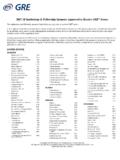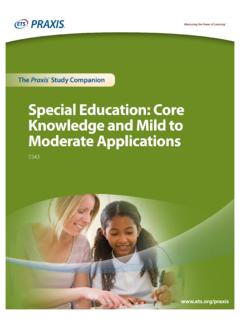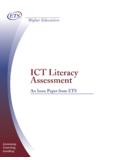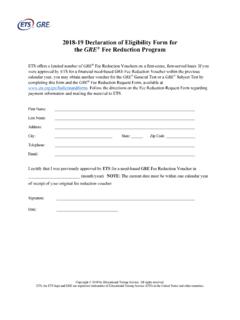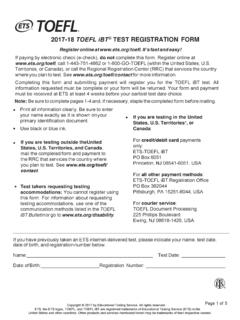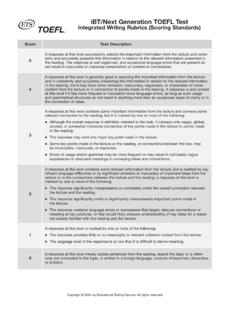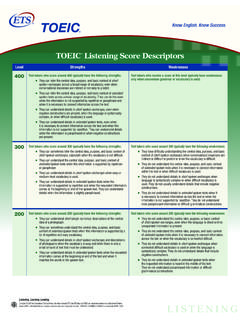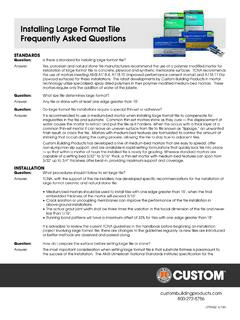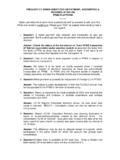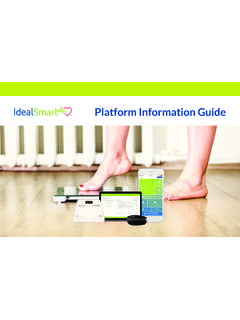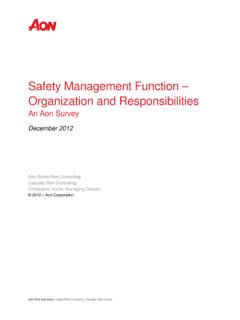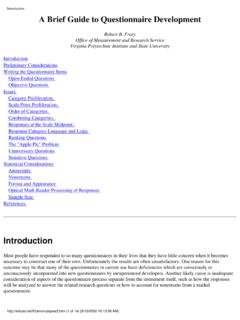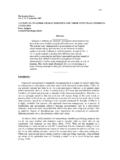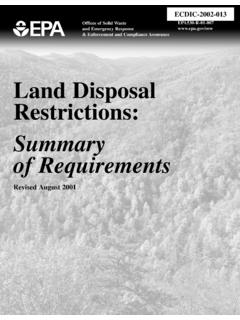Transcription of Principles of Learning and Teaching: Grades 7–12 …
1 The Praxis Study CompanionPrinciples of Learning and teaching : Grades 7 12 56242 The Praxis Study CompanionWelcome to the Praxis Study CompanionWelcome to the Praxis Study Companion Prepare to Show What You KnowYou have been working to acquire the knowledge and skills you need for your teaching career. Now you are ready to demonstrate your abilities by taking a Praxis test. Using the Praxis Study Companion is a smart way to prepare for the test so you can do your best on test day. This guide can help keep you on track and make the most efficient use of your study Study Companion contains practical information and helpful tools, including: An overview of the Praxis tests Specific information on the Praxis test you are taking A template study plan Study topics Practice questions and explanations of correct answers Test-taking tips and strategies Frequently asked questions Links to more detailed informationSo where should you start?
2 Begin by reviewing this guide in its entirety and note those sections that you need to revisit. Then you can create your own personalized study plan and schedule based on your individual needs and how much time you have before test in mind that study habits are individual. There are many different ways to successfully prepare for your test. Some people study better on their own, while others prefer a group dynamic. You may have more energy early in the day, but another test taker may concentrate better in the evening. So use this guide to develop the approach that works best for teaching career begins with preparation. Good luck!Know What to ExpectWhich tests should I take? Each state or agency that uses the Praxis tests sets its own requirements for which test or tests you must take for the teaching area you wish to you register for a test, confirm your state or agency s testing requirements at are the Praxis tests given?
3 Praxis tests are given on computer. Other formats are available for test takers approved for accommodations (see page 50).3 The Praxis Study CompanionWelcome to the Praxis Study CompanionWhat should I expect when taking the test on computer?When taking the test on computer, you can expect to be asked to provide proper identification at the test center. Once admitted, you will be given the opportunity to learn how the computer interface works (how to answer questions, how to skip questions, how to go back to questions you skipped, etc.) before the testing time begins. Watch the What to Expect on Test Day video to see what the experience is and when are the Praxis tests offered?You can select the test center that is most convenient for you.
4 The Praxis tests are administered through an international network of test centers, which includes Prometric Testing Centers, some universities, and other locations throughout the schedules may differ, so see the Praxis web site for more detailed test registration information at The Praxis Study Companion4 Table of ContentsTable of ContentsThe Praxis Study Companion guides you through the steps to success1. Learn About Your Test ..5 Learn about the specific test you will be taking2. Familiarize Yourself with Test Questions ..14 Become comfortable with the types of questions you ll find on the Praxis tests3. Practice with Sample Test Questions ..18 Answer practice questions and find explanations for correct answers4.
5 Determine Your Strategy for Success ..28 Set clear goals and deadlines so your test preparation is focused and efficient5. Develop Your Study Plan ..31 Develop a personalized study plan and schedule6. Review Study Topics ..35 Review study topics with questions for discussion7. Review Smart Tips for Success ..48 Follow test-taking tips developed by experts8. Check on Testing Accommodations ..50 See if you qualify for accommodations to take the Praxis test9. Do Your Best on Test Day ..51 Get ready for test day so you will be calm and confident10. Understand Your Scores ..53 Understand how tests are scored and how to interpret your test scoresAppendix: Other Questions You May Have ..55 The Praxis Study Companion5 Step 1: Learn About Your Test1.
6 Learn About Your TestLearn about the specific test you will be takingPrinciples of Learning and teaching : Grades 7 12 (5624)Test at a GlanceTest NamePrinciples of Learning and teaching : Grades 7 12 Test Code5624 Time2 hoursNumber of Questions70 selected-response questions, 4 constructed-response questionsFormatSelected-response; constructed-response questions related to two case historiesTest DeliveryComputer deliveredContent CategoriesApprox. Number of Selected-response QuestionsApprox. Number of Constructed-response QuestionsApprox. Percentage of TestI. Students as Instructional Assessment1415%IV. Professional Development Leadership, and Community1415%V. Analysis of Instructional Scenarios425% Students as Learners1 2 Instructional Process1 2 Assessment0 1 Professional Development, Leadership, and Community0 1 VIVIIIIIIP acing and Special Tips In allocating time on this assessment, it is expected that about 70 minutes will be spent on the selected-response section and about 50 minutes will be spent on the constructed-response section.
7 The sections are not independently Praxis Study Companion6 Step 1: Learn About Your TestAbout This TestThe purpose of this test is to assess a new teacher s knowledge and understanding of educational practices foundational to beginning a career as a professional educator. The test content assesses key indicators of the beginning educator s knowledge of topics such as human development, Learning processes, instructional processes, diverse learners, educational psychology, and professional issues. Examinees taking Principles of Learning and teaching (PLT ) will typically have completed, or will have nearly completed, an undergraduate education program. Each test includes questions that apply specifically to the stated grade range of the test as well as some that are universal to all grade test may contain some questions that will not count toward your SpecificationsTest specifications in this chapter describe the knowledge and skills measured by the test.
8 Study topics to help you prepare to answer test questions can be found on page Students as LearnersA. Student Development and the Learning Process1. Understands the theoretical foundations of how students learna. knows how knowledge is constructedb. knows a variety of means by which skills are acquiredc. understands a variety of cognitive processes and how they are developed2. Knows the major contributions of foundational theorists to educationa. relates the work of theorists to educational contexts Bandura Bruner Dewey Piaget Vygotsky Kohlberg Bloom3. Understands the concepts and terms related to a variety of Learning theoriesa. metacognitionb. schemac. transferd. self-efficacye.
9 Self-regulationf. zone of proximal developmentg. classical and operant conditioning4. Knows the distinguishing characteristics of the stages in each domain of human development ( , cognitive, physical, social, and moral)a. describes the characteristics of a typical child in each stage and each domainb. recognizes typical and atypical variance within each stage and each domain5. Understands how Learning theory and human development impact the instructional processa. defines the relationship between Learning theory and human developmentb. provides examples of how Learning theory is impacted by human developmentc. uses knowledge of Learning theory to solve educational problemsd. uses knowledge of human development to solve educational problemsB.
10 Students as Diverse Learners1. Understands that a number of variables affect how individual students learn and performa. identifies a number of variables that affect how students learn and perform Learning style gender culture socioeconomic status prior knowledge and experience motivation self-confidence, self-esteem cognitive development maturity languageb. provides examples of how variables might affect how students learn and perform7 The Praxis Study Companion7 Step 1: Learn About Your Test2. Recognizes areas of exceptionality and their potential impact on student learninga. identifies areas of exceptionality cognitive auditory visual motor/physical speech/language behavioralb.
